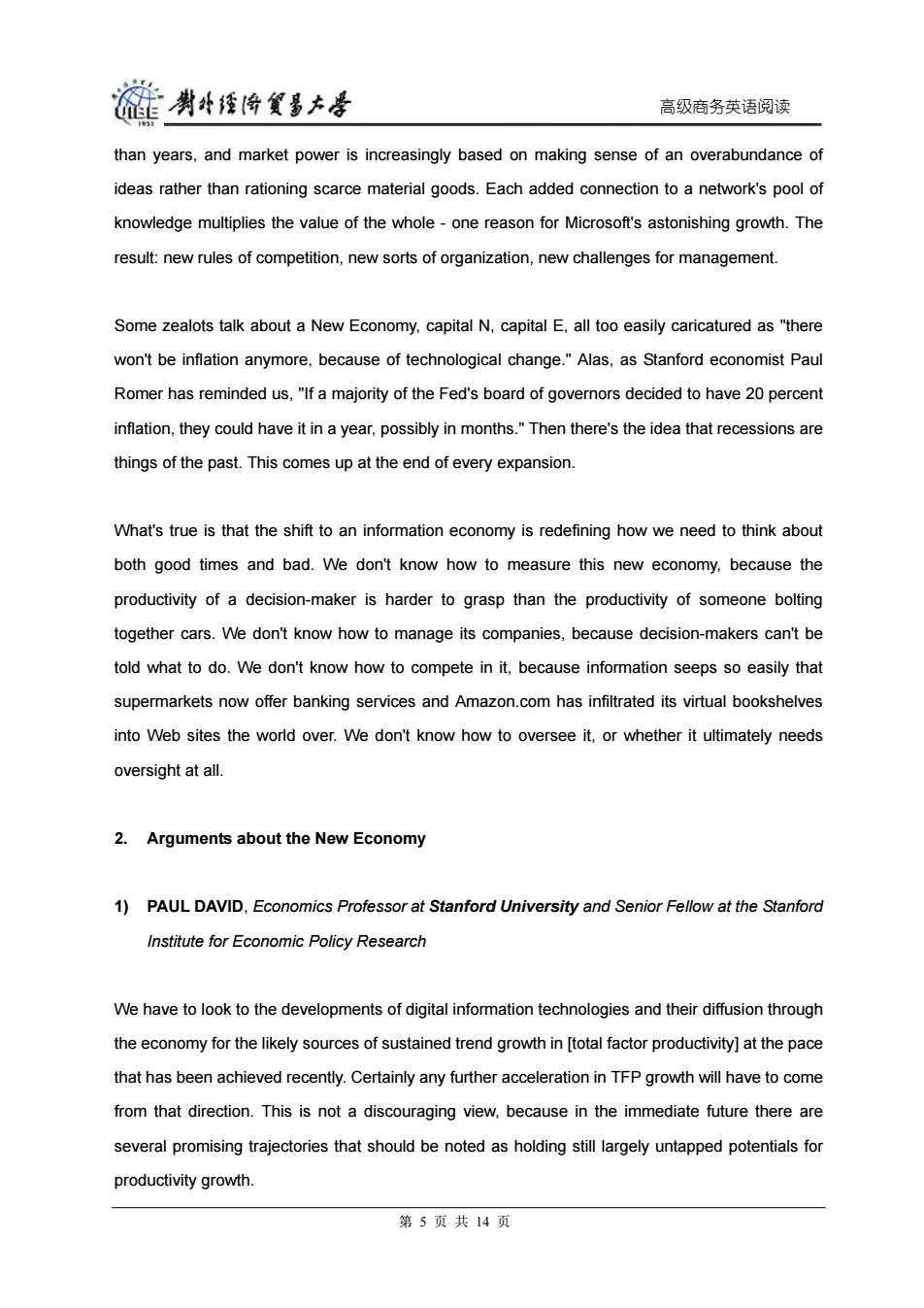正在加载图片...

链潮4将置多大孝 高级商务英语阅读 than years,and market power is increasingly based on making sense of an overabundance of ideas rather than rationing scarce material goods.Each added connection to a network's pool of knowledge multiplies the value of the whole-one reason for Microsoft's astonishing growth.The result:new rules of competition,new sorts of organization,new challenges for management. Some zealots talk about a New Economy,capital N,capital E,all too easily caricatured as"there won't be inflation anymore,because of technological change."Alas,as Stanford economist Paul Romer has reminded us,"If a majority of the Fed's board of governors decided to have 20 percent inflation,they could have it in a year,possibly in months."Then there's the idea that recessions are things of the past.This comes up at the end of every expansion. What's true is that the shift to an information economy is redefining how we need to think about both good times and bad.We don't know how to measure this new economy,because the productivity of a decision-maker is harder to grasp than the productivity of someone bolting together cars.We don't know how to manage its companies,because decision-makers can't be told what to do.We don't know how to compete in it,because information seeps so easily that supermarkets now offer banking services and Amazon.com has infiltrated its virtual bookshelves into Web sites the world over.We don't know how to oversee it,or whether it ultimately needs oversight at all. 2.Arguments about the New Economy 1) PAUL DAVID,Economics Professor at Stanford University and Senior Fellow at the Stanford Institute for Economic Policy Research We have to look to the developments of digital information technologies and their diffusion through the economy for the likely sources of sustained trend growth in [total factor productivity]at the pace that has been achieved recently.Certainly any further acceleration in TFP growth will have to come from that direction.This is not a discouraging view,because in the immediate future there are several promising trajectories that should be noted as holding still largely untapped potentials for productivity growth. 第5页共14页高级商务英语阅读 than years, and market power is increasingly based on making sense of an overabundance of ideas rather than rationing scarce material goods. Each added connection to a network's pool of knowledge multiplies the value of the whole - one reason for Microsoft's astonishing growth. The result: new rules of competition, new sorts of organization, new challenges for management. Some zealots talk about a New Economy, capital N, capital E, all too easily caricatured as "there won't be inflation anymore, because of technological change." Alas, as Stanford economist Paul Romer has reminded us, "If a majority of the Fed's board of governors decided to have 20 percent inflation, they could have it in a year, possibly in months." Then there's the idea that recessions are things of the past. This comes up at the end of every expansion. What's true is that the shift to an information economy is redefining how we need to think about both good times and bad. We don't know how to measure this new economy, because the productivity of a decision-maker is harder to grasp than the productivity of someone bolting together cars. We don't know how to manage its companies, because decision-makers can't be told what to do. We don't know how to compete in it, because information seeps so easily that supermarkets now offer banking services and Amazon.com has infiltrated its virtual bookshelves into Web sites the world over. We don't know how to oversee it, or whether it ultimately needs oversight at all. 2. Arguments about the New Economy 1) PAUL DAVID, Economics Professor at Stanford University and Senior Fellow at the Stanford Institute for Economic Policy Research We have to look to the developments of digital information technologies and their diffusion through the economy for the likely sources of sustained trend growth in [total factor productivity] at the pace that has been achieved recently. Certainly any further acceleration in TFP growth will have to come from that direction. This is not a discouraging view, because in the immediate future there are several promising trajectories that should be noted as holding still largely untapped potentials for productivity growth. 第 5 页 共 14 页